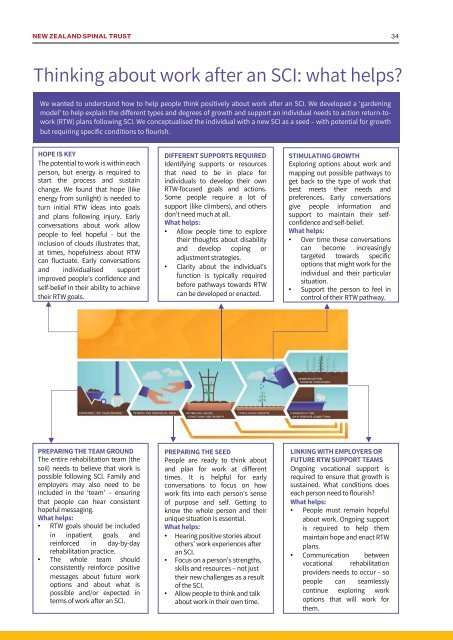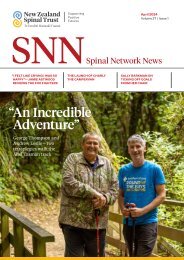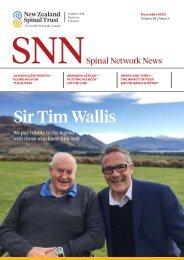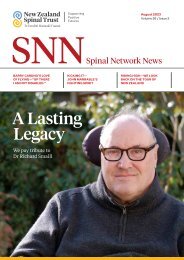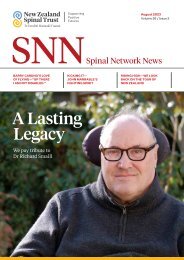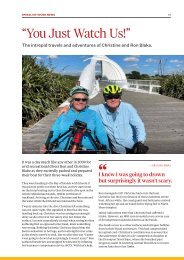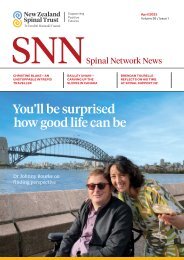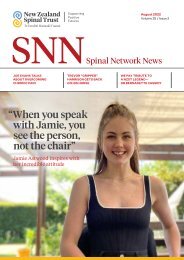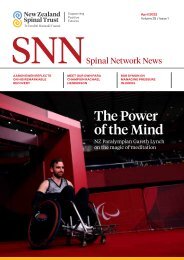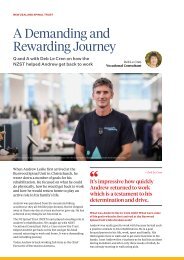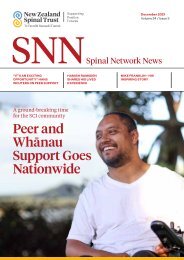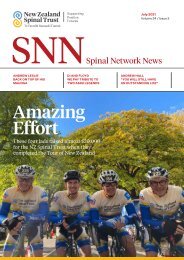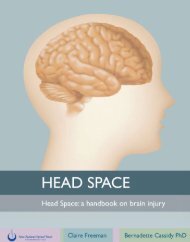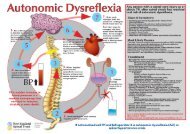SNN_December 2022 Issue_web low res
You also want an ePaper? Increase the reach of your titles
YUMPU automatically turns print PDFs into web optimized ePapers that Google loves.
NEW ZEALAND SPINAL TRUST 34<br />
Thinking about work after an SCI: what helps?<br />
We wanted to understand how to help people think positively about work after an SCI. We developed a ‘gardening<br />
model’ to help explain the different types and degrees of growth and support an individual needs to action return-towork<br />
(RTW) plans fol<strong>low</strong>ing SCI. We conceptualised the individual with a new SCI as a seed – with potential for growth<br />
but requiring specific conditions to flourish.<br />
HOPE IS KEY<br />
The potential to work is within each<br />
person, but energy is required to<br />
start the process and sustain<br />
change. We found that hope (like<br />
energy from sunlight) is needed to<br />
turn initial RTW ideas into goals<br />
and plans fol<strong>low</strong>ing injury. Early<br />
conversations about work al<strong>low</strong><br />
people to feel hopeful - but the<br />
inclusion of clouds illustrates that,<br />
at times, hopefulness about RTW<br />
can fluctuate. Early conversations<br />
and individualised support<br />
improved people’s confidence and<br />
self-belief in their ability to achieve<br />
their RTW goals.<br />
DIFFERENT SUPPORTS REQUIRED<br />
Identifying supports or <strong>res</strong>ources<br />
that need to be in place for<br />
individuals to develop their own<br />
RTW-focused goals and actions.<br />
Some people require a lot of<br />
support (like climbers), and others<br />
don’t need much at all.<br />
What helps:<br />
• Al<strong>low</strong> people time to explore<br />
their thoughts about disability<br />
and develop coping or<br />
adjustment strategies.<br />
• Clarity about the individual’s<br />
function is typically required<br />
before pathways towards RTW<br />
can be developed or enacted.<br />
STIMULATING GROWTH<br />
Exploring options about work and<br />
mapping out possible pathways to<br />
get back to the type of work that<br />
best meets their needs and<br />
preferences. Early conversations<br />
give people information and<br />
support to maintain their selfconfidence<br />
and self-belief.<br />
What helps:<br />
• Over time these conversations<br />
can become increasingly<br />
targeted towards specific<br />
options that might work for the<br />
individual and their particular<br />
situation.<br />
• Support the person to feel in<br />
control of their RTW pathway.<br />
PREPARING THE TEAM GROUND<br />
The entire rehabilitation team (the<br />
soil) needs to believe that work is<br />
possible fol<strong>low</strong>ing SCI. Family and<br />
employers may also need to be<br />
included in the ‘team’ – ensuring<br />
that people can hear consistent<br />
hopeful messaging.<br />
What helps:<br />
• RTW goals should be included<br />
in inpatient goals and<br />
reinforced in day-by-day<br />
rehabilitation practice.<br />
• The whole team should<br />
consistently reinforce positive<br />
messages about future work<br />
options and about what is<br />
possible and/or expected in<br />
terms of work after an SCI.<br />
PREPARING THE SEED<br />
People are ready to think about<br />
and plan for work at different<br />
times. It is helpful for early<br />
conversations to focus on how<br />
work fits into each person’s sense<br />
of purpose and self. Getting to<br />
know the whole person and their<br />
unique situation is essential.<br />
What helps:<br />
• Hearing positive stories about<br />
others’ work experiences after<br />
an SCI.<br />
• Focus on a person’s strengths,<br />
skills and <strong>res</strong>ources – not just<br />
their new challenges as a <strong>res</strong>ult<br />
of the SCI.<br />
• Al<strong>low</strong> people to think and talk<br />
about work in their own time.<br />
LINKING WITH EMPLOYERS OR<br />
FUTURE RTW SUPPORT TEAMS<br />
Ongoing vocational support is<br />
required to ensure that growth is<br />
sustained. What conditions does<br />
each person need to flourish?<br />
What helps:<br />
• People must remain hopeful<br />
about work. Ongoing support<br />
is required to help them<br />
maintain hope and enact RTW<br />
plans.<br />
• Communication between<br />
vocational rehabilitation<br />
providers needs to occur - so<br />
people can seamlessly<br />
continue exploring work<br />
options that will work for<br />
them.


